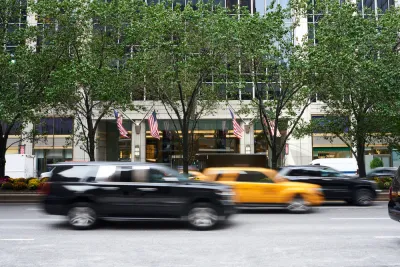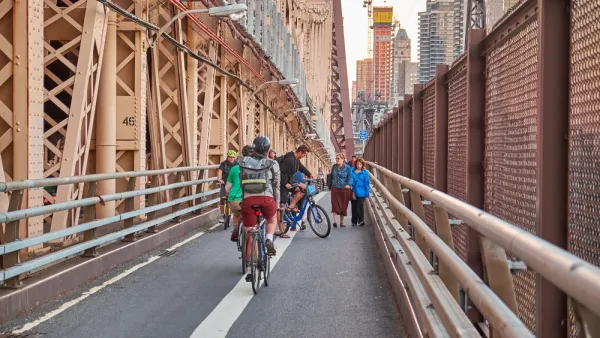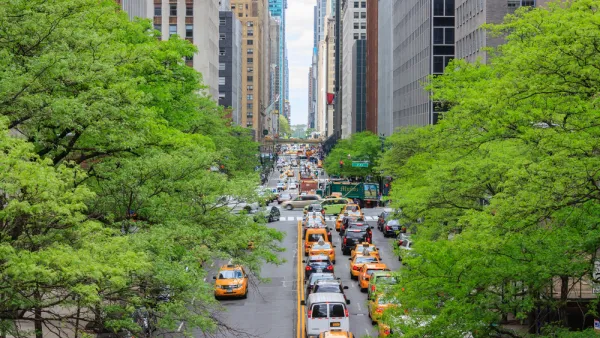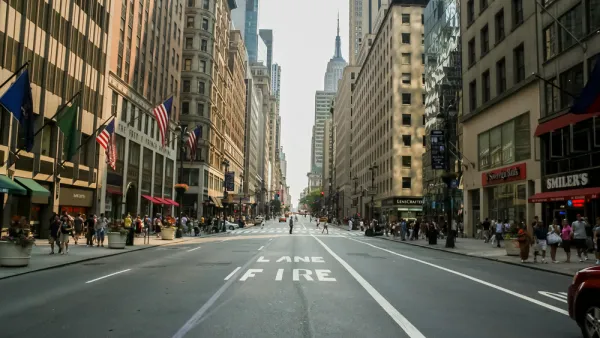It was former London mayor Richard Livingstone who accused leaders of cowardice for not supporting congestion pricing, notes a New York Times op-ed that warns that the New York City mayor and New York State governor may "bungle" the opportunity.

"Traffic has become an urban scourge, and not only in New York," writes David Leonhardt, an op-ed columnist for The New York Times. "The average vehicle speed in Midtown today is just 4.7 miles an hour. That’s 28 percent slower than five years ago."
Around the world, it is a drag on economic activity and the quality of life. People waste hours in it, all the while sending pollution into the air. No wonder both Mayor Bill de Blasio and Gov. Andrew Cuomo are promising a solution.
Unfortunately, there is a good chance they are going to bungle it.
De Blasio opposes congestion pricing. "He instead favors a millionaires’ tax to pay for subway improvements," notes Leonhardt, which may be "a fine idea, but won’t unclog roads. For that, de Blasio has offered a series of small, complex measures, like banning deliveries during rush hour."
While Cuomo appears open to congestion pricing, he has yet to submit a plan, and may ultimately support a congestion charge only for ride-hailing services.
That’s a strangely anti-environment compromise, because it encourages people to own their own cars. The New York of the future should have fewer space-clogging cars, not more.
"Traffic is a classic “tragedy of the commons" problem," adds Leonhardt, a former economics writer. Owned by the public, every motorist benefits by using road space, paying only for their vehicles and the fuel to power them.
The good news is that modern societies have developed a solution to the tragedy: Charge money to use the commons. Doing so not only discourages overuse, it also raises funds that can solve the larger need.
In fact, it is the need to raise at least $100 billion to renovate the aging subway system that is one of the most compelling reason for the program.
The charge for using clogged roads is known as “congestion pricing,” and it works well where it has been tried, like London, Singapore and Stockholm.
The reason more cities haven’t adopted congestion pricing, says former Mayor Ken Livingstone [who introduced congestion pricing in 2003,] is "political cowardice." People cling to the idea that driving should be free, even though it imposes big costs on others.
While additional driving charges are indeed regressive, Leonhardt notes that "[o]nly 3 percent of poor and near-poor outer-borough workers drive into Manhattan for their jobs, the Community Service Society of New York found [see pie charts]. A whopping 61 percent take the subway or bus."
Leonhardt ends his op-ed by recognizing the political bent of both leaders, and the opportunity to promote New York City as a model for other traffic-plagued cities.
Both de Blasio and Cuomo would like to be national progressive leaders. New York’s packed roads and hobbled subways have given them a great opportunity. They can lead the way toward a pro-environment, pro-worker solution that would be a model for other cities.
Hat tip to Eugene Wilson via Sierra Club Green Transportation.
FULL STORY: How to Get New York Moving Again

Analysis: Cybertruck Fatality Rate Far Exceeds That of Ford Pinto
The Tesla Cybertruck was recalled seven times last year.

National Parks Layoffs Will Cause Communities to Lose Billions
Thousands of essential park workers were laid off this week, just before the busy spring break season.

Retro-silient?: America’s First “Eco-burb,” The Woodlands Turns 50
A master-planned community north of Houston offers lessons on green infrastructure and resilient design, but falls short of its founder’s lofty affordability and walkability goals.

Test News Post 1
This is a summary

Analysis: Cybertruck Fatality Rate Far Exceeds That of Ford Pinto
The Tesla Cybertruck was recalled seven times last year.

Test News Headline 46
Test for the image on the front page.
Urban Design for Planners 1: Software Tools
This six-course series explores essential urban design concepts using open source software and equips planners with the tools they need to participate fully in the urban design process.
Planning for Universal Design
Learn the tools for implementing Universal Design in planning regulations.
EMC Planning Group, Inc.
Planetizen
Planetizen
Mpact (formerly Rail~Volution)
Great Falls Development Authority, Inc.
HUDs Office of Policy Development and Research
NYU Wagner Graduate School of Public Service




























